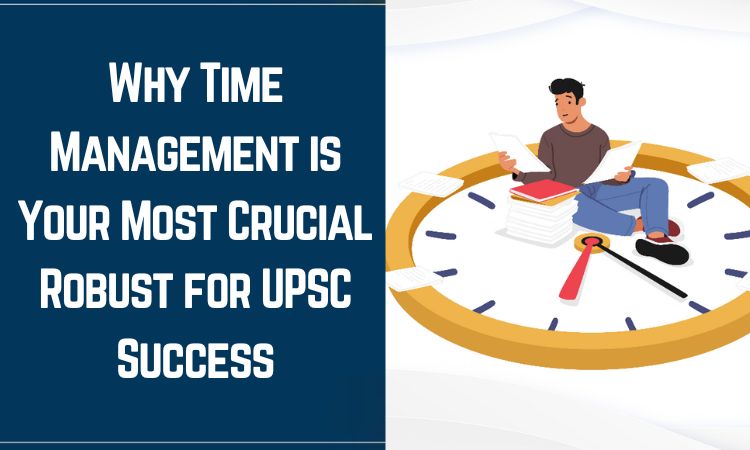Why Time Management Is Your Most Crucial Robust For UPSC Success

Every year, lakhs of aspirants embark on the difficult journey to crack the UPSC Civil Services Examination. The UPSC IAS exam is not just a test of knowledge, it's a marathon of discipline, perseverance and strategic planning. In this difficult folks against the calendar, effective time management is not just a helpful skill. It is the very foundation upon which success is gathered.
Why Time Management is Non-Negotiable for UPSC
Vast UPSC Syllabus: The UPSC syllabus for IAS exam is famously expansive and abstract. Without a time-bound plan, it's easy to either get lost in one topic for too long or to skim over others hardly. Time management provides the structure needed to ensure comprehensive coverage.
Dual Demand of Prelims and Mains: The preparation for Prelims (objective) and Mains (descriptive) requires different approaches and mindsets. Balancing both simultaneously, especially in the months leading up to the exams, demands a carefully crafted schedule.
Consistency Over Cramming: The UPSC rewards sustained effort over time. A well-managed schedule promotes daily consistency, which leads to deeper understanding and long-term retention, making last-minute cramming ineffective and unnecessary.
The Essential Balance: Aspirants are not robots. Burnout is a real and common derailment. A good time management plan intentionally carves out time for breaks, hobbies, physical exercise, and family, ensuring you stay mentally and physically fit throughout the long preparation.
Reducing Anxiety and Building Confidence: The overwhelming feeling of having "too much to study" is a significant source of stress. A clear daily and weekly plan breaks this mountain into manageable molehills. Each completed task boosts confidence and reduces anxiety, creating a positive feedback loop.
Simply, Mastering your time is similar to mastering the UPSC journey.
Top 10 UPSC Time Management Tips for Civil Services Aspirants
Here’s how you can translate the principle of time management into actionable strategies:
1. Craft a SMART Study Plan:
Don’t just make a vague resolution to "study history." Create a Specific, Measurable, Achievable, Relevant, and Time-bound (SMART) plan. For example: "From 10 AM to 1 PM, I will complete World History modules 3 & 4 and make 15 flashcards of key terminologies."
2. Embrace the Power of a Timetable:
Develop a realistic weekly timetable. Allocate specific hours to specific subjects, balancing your strong and weak areas. Remember to block time for current affairs, revision, and answer writing practice. Treat this timetable as a sacred contract with yourself.
3. Prioritize with the Pareto Principle (80/20 Rule):
Identify the high-yield topics that frequently appear in exams. Often, 20% of the effort (on the right sources) can yield 80% of the results. Focus on NCERTs, standard books, and previous years’ question papers to identify these areas.
4. The Golden Hour: Early Morning Revision:
Your mind is freshest after sleep. Utilize the first 1-2 hours of your day for revision. Recalling what you studied the previous day strengthens neural pathways and dramatically improves retention. This is more valuable than consuming new information at that time.
5. Dedicate Time for Answer Writing:
Knowledge is useless if you cannot present it effectively within the time limit. From the early stages, dedicate fixed hours solely to answer writing both for Prelims practice tests and Mains style answers. This is a separate skill that needs dedicated practice.
6. Schedule Current Affairs, Don’t Let It Consume You:
It's easy to fall into the rabbit hole of endless news reading. Limit your current affairs intake to a fixed 60-90 minutes per day. Rely on one or two trusted sources (like a daily newspaper and a monthly compilation) instead of scrolling endlessly through multiple apps.
7. Learn to Say ‘No’:
Protect your study time fiercely. This means declining non-essential social gatherings, minimizing screen time on entertainment, and setting boundaries with family and friends. Explain your goals to them so they can support your journey.
8. Incorporate Active Breaks:
Studying for 8-10 hours doesn’t mean 10 hours of continuous sitting. Use techniques like the Pomodoro Technique (e.g., 50 minutes study, 10 minutes break). During breaks, move away from your desk—stretch, take a walk, hydrate, or meditate. This refreshes your focus.
9. Weekly Review and Flexible Adjustment:
Your timetable is a guide, not a rigid prison. At the end of each week, review your progress. What worked? What didn't? Were your targets unrealistic? Adjust your plan for the next week accordingly. Flexibility is key to sustainability.
10. Never Compromise on Sleep and Health:
This is the most underrated tip. Sacrificing sleep to gain an extra hour of study is a losing bargain. It impairs memory, concentration, and analytical ability the next day. A well-rested mind of 7-8 hours of sleep is far more efficient than a sleep-deprived one.
The Final Word-
Effective time management for IAS preparation involves setting realistic goals, creating a daily study schedule with time blocks for specific subjects and revision, minimizing distractions by limiting social media and organizing your study space, and practicing with mock tests under timed conditions. Time is the one resource every UPSC aspirant has in equal measure. How you choose to invest it ultimately defines your outcome. By embracing a strategic and disciplined approach to UPSC time management, you transform from a passive learner into an active architect of your own success. You stop chasing the syllabus and start conquering it, one well-planned day at a time.
